-
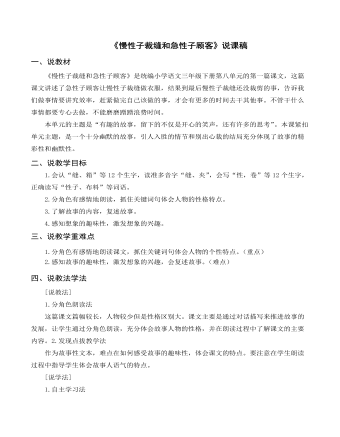
(说课稿)部编人教版三年级下册《 慢性子裁缝和急性子顾客》
一、说教材《慢性子裁缝和急性子顾客》是统编小学语文三年级下册第八单元的第一篇课文,这篇课文讲述了急性子顾客让慢性子裁缝做衣服,结果到最后慢性子裁缝还没裁剪的事,告诉我们做事情要讲究效率,赶紧做完自己该做的事,才会有更多的时间去干其他事。不管干什么事情都要专心去做,不能磨磨蹭蹭浪费时间。本单元的主题是“有趣的故事,留下的不仅是开心的笑声,还有许多的思考”。本课紧扣单元主题,是一个十分幽默的故事,引人入胜的情节和别出心裁的结局充分体现了故事的精彩性和幽默性。二、说教学目标 1.会认“缝、箱”等12个生字,读准多音字“缝、夹”,会写“性,卷”等12个生字,正确读写“性子、布料”等词语。
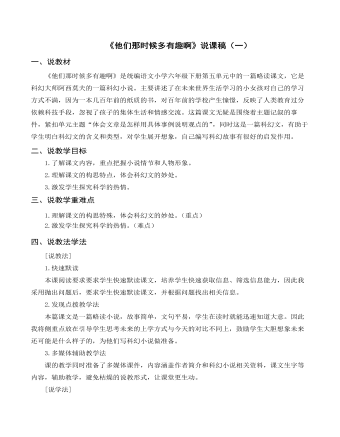
部编人教版六年级下册《他们那时候多有趣啊》说课稿(一)
一、说教材《他们那时候多有趣啊》是统编语文小学六年级下册第五单元中的一篇略读课文,它是科幻大师阿西莫夫的一篇科幻小说。主要讲述了在未来世界生活学习的小女孩对自己的学习方式不满,因为一本几百年前的纸质的书,对百年前的学校产生憧憬,反映了人类教育过分依赖科技手段,忽视了孩子的集体生活和情感交流。这篇课文无疑是围绕着主题记叙的事件,紧扣单元主题“体会文章是怎样用具体事例说明观点的”,同时这是一篇科幻文,有助于学生明白科幻文的含义和类型,对学生展开想象,自己编写科幻故事有很好的启发作用。二、说教学目标1.了解课文内容,重点把握小说情节和人物形象。 2.理解课文的构思特点,体会科幻文的妙处。 3.激发学生探究科学的热情。三、说教学重难点1.理解课文的构思特殊,体会科幻文的妙处。(重点)2.激发学生探究科学的热情。(难点)
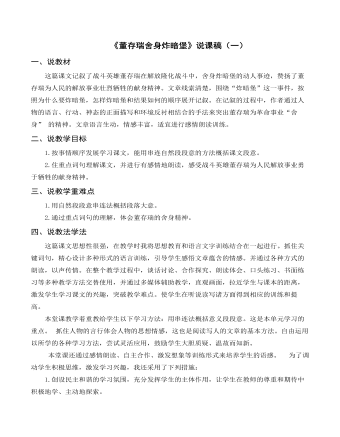
部编人教版六年级下册《董存瑞舍身炸暗堡》说课稿(一)
四、说教法学法这篇课文思想性很强,在教学时我将思想教育和语言文字训练结合在一起进行。抓住关键词句,精心设计多种形式的语言训练,引导学生感悟文章蕴含的情感。并通过各种方式的 朗读,以声传情。在整个教学过程中,谈话讨论、合作探究、朗读体会、口头练习、书面练 习等多种教学方法交替使用,并通过多媒体辅助教学,直观画面,拉近学生与课本的距离,激发学生学习课文的兴趣,突破教学难点。使学生在听说读写诸方面得到相应的训练和提高。 本堂课教学着重教给学生以下学习方法:用串连法概括意义段段意。这是本单元学习的重点。 抓住人物的言行体会人物的思想情感,这也是阅读写人的文章的基本方法。自由运用以所学的各种学习方法,尝试灵活应用,鼓励学生大胆质疑、温故而知新。本堂课还通过感情朗读、自主合作、激发想象等训练形式来培养学生的语感。 为了调动学生积极思维,激发学习兴趣,我还采用了下列措施:
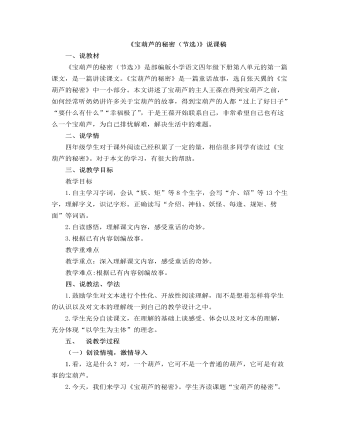
部编人教版四年级下册《 宝葫芦的秘密(节选)》说课稿
三、说教学目标教学目标1.自主学习字词,会认“妖、矩”等8个生字,会写“介、绍”等13个生字,理解字义,识记字形。正确读写“介绍、神仙、妖怪、每逢、规矩、劈面”等词语。2.自读感悟,理解课文内容,感受童话的奇妙。3.根据已有内容创编故事。教学重难点教学重点:深入理解课文内容,感受童话的奇妙。教学难点:根据已有内容创编故事。四、说教法、学法1.鼓励学生对文本进行个性化、开放性阅读理解,而不是想着怎样将学生的认识以及对文本的理解统一到自己的教学设计之中。2.学生充分自读课文,在理解的基础上谈感受、体会以及对文本的理解,充分体现“以学生为主体”的理念。
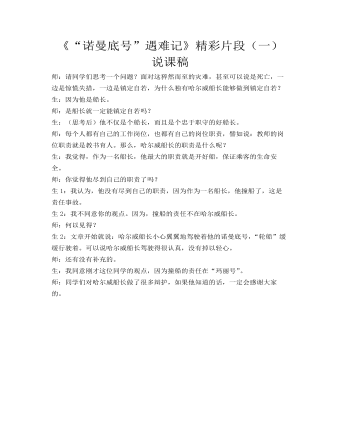
部编人教版四年级下册《 “诺曼底号”遇难记》精彩片段(一)说课稿
师:请同学们思考一个问题?面对这猝然而至的灾难,甚至可以说是死亡,一边是惊慌失措,一边是镇定自若,为什么独有哈尔威船长能够做到镇定自若?生:因为他是船长。师:是船长就一定能镇定自若吗??生:(思考后)他不仅是个船长,而且是个忠于职守的好船长。师:每个人都有自己的工作岗位,也都有自己的岗位职责,譬如说:教师的岗位职责就是教书育人。那么,哈尔威船长的职责是什么呢?生:我觉得,作为一名船长,他最大的职责就是开好船,保证乘客的生命安全。?师:你觉得他尽到自己的职责了吗?
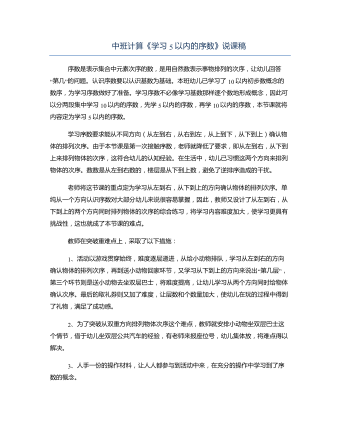
中班计算《学习5以内的序数》说课稿
序数是表示集合中元素次序的数,是用自然数表示事物排列的次序,让幼儿回答“第几”的问题。认识序数要以认识基数为基础。本班幼儿已学习了10以内初步数概念的数序,为学习序数做好了准备。学习序数不必像学习基数那样逐个数地形成概念,因此可以分两段集中学习10以内的序数,先学5以内的序数,再学10以内的序数,本节课就将内容定为学习5以内的序数。学习序数要求能从不同方向(从左到右,从右到左,从上到下,从下到上)确认物体的排列次序。由于本节课是第一次接触序数,老师就降低了要求,即从左到右,从下到上来排列物体的次序,这符合幼儿的认知经验。在生活中,幼儿已习惯这两个方向来排列物体的次序。数数是从左到右数的,楼层是从下到上数,避免了逆排序造成的干扰。
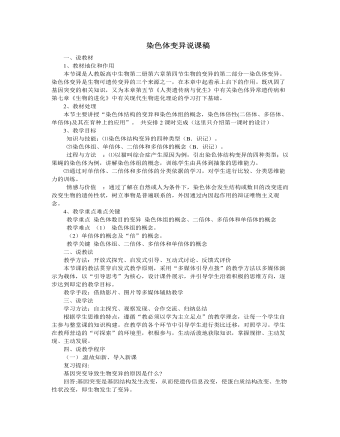
人教版高中生物必修2染色体变异说课稿
四、说教学程序(一).温故知新、导入新课复习提问:基因突变导致生物变异的原因是什么?回答:基因突变是基因结构发生改变,从而使遗传信息改变,使蛋白质结构改变、生物性状改变,即生物发生了变异。那么,基因是什么?它和染色体又有何关系?回答:基因是有遗传效应的DNA片断,染色体是DNA的载体,基因在染色体上呈线形排列。引出新知:对于一个生物体来说,正常情况下,其染色体的结构和数量都是稳定的。但在自然条件或人为因素的影响下,染色体的结构和数量均会发生改变,从而导致生物性状的改变,这就属于染色体变异。(二).把握重点、突破难点重点的把握:1、染色体结构的变异播放影片:猫叫综合征幼儿。让学生观察: 患儿哭声轻、音调高,很像猫叫。教师补充: 患儿的征状---两眼较低、耳位低下,存在着严重的智力障碍。阐述病因---染色体片段缺失
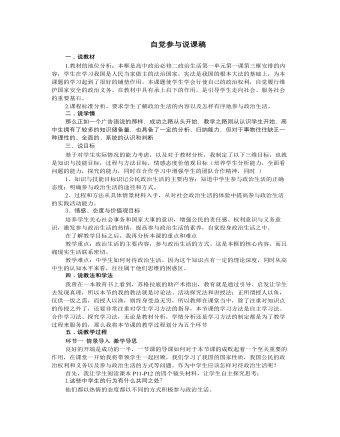
人教版高中政治必修2自觉参与说课稿
1.必须明确政治生活的作用 (政治生活与经济生活、文化生活是相辅相成的。政治生活直接影响到人民民主的实现程度,影响全体人民利益,也会影响我们的经济生活、文化生活。)2.需要学习政治知识 (5个有助于)3.需要参加政治实践活动。 (参加政治实践的途径;参加政治实践的意义)(通过情景问题,形成学生如何参与政治生活的方法;通过解决问题,培养学生解决问题的能力和发散思维的能力。)环节四 课堂小结 巩固知识本节课我采用线索性的板书,整个知识结构一目了然,为了充分发挥学生在课堂的主体地位,我将课堂小结交由学生完成,请学生根据课堂学习的内容,结合我的板书设计来进行小结,以此来帮助教师在第一时间掌握学生学习信息的反馈,同时培养学生归纳分析能力、概括能力。
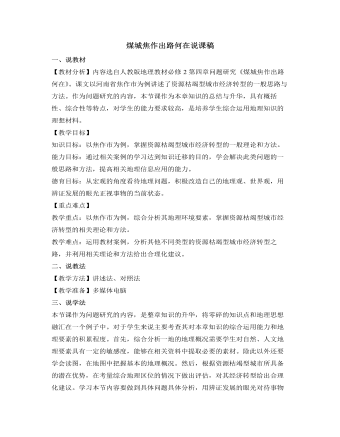
人教版高中地理必修2煤城焦作出路何在说课稿
分析过焦作市的地理概况和产业优势后,就需要针对由于资源枯竭所带来的问题提出合理化的建议。既然是谈经济转型,就应该将话题的范围明确在这一领域内。通过材料3的相关内容,我们了解到焦作市需要在产业结构调整、培育新的优势产业、增强综合竞争力等三个整改方针上下功夫。因而引导学生针对优势与不足提出建议,以三个整改方针为基准,衡量建议的可行性是锻炼学生解决此类问题的有效途径。在此我将教会学生的是解决问题方法而非案例的内容,正所谓“授之以鱼,不如授之以渔”。接下来针对学生的建议和教材资料分析所罗列的10点整改思路,由学生自由发言提出看法,通过教师的指导和学生的讨论,进而确定经济转型建议的具体方案。最后注意将建议与产业优势相对照,看建议是否都是围绕着产业优势而提出的,这样做会加深学生的印象,通过建议和优势的对应关系,将不难找出此类问题的解题思路。
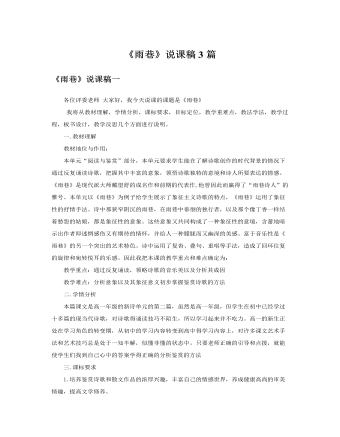
人教版高中语文必修1《雨巷》说课稿3篇
一.教材理解教材地位与作用:本单元“阅读与鉴赏”部分,本单元要求学生能在了解诗歌创作的时代背景的情况下通过反复诵读诗歌,把握其中丰富的意象,领悟诗歌独特的意境和诗人所要表达的情感。《雨巷》是现代派大师戴望舒的成名作和前期的代表作,他曾因此而赢得了“雨巷诗人”的雅号。本单元以《雨巷》为例子给学生展示了象征主义诗歌的特点,《雨巷》运用了象征性的抒情手法。诗中那狭窄阴沉的雨巷,在雨巷中徘徊的独行者,以及那个像丁香一样结着愁怨的姑娘,都是象征性的意象。这些意象又共同构成了一种象征性的意境,含蓄地暗示出作者即迷惘感伤又有期待的情怀,并给人一种朦胧而又幽深的美感。富于音乐性是《雨巷》的另一个突出的艺术特色。诗中运用了复沓、叠句、重唱等手法,造成了回环往复的旋律和宛转悦耳的乐感。因此我把本课的教学重点和难点确定为:教学重点:通过反复诵读,领略诗歌的音乐美以及分析其成因教学难点:分析意象以及其象征意义初步掌握鉴赏诗歌的方法
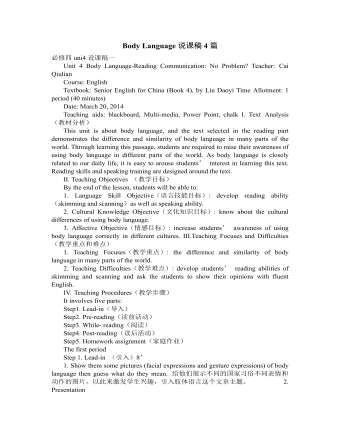
人教版高中英语必修4Body Language说课稿4篇
Textbook: Senior English for China (Book 4), by Liu Daoyi Time Allotment: 1 period (40 minutes)Date: March 20, 2014Teaching aids: blackboard, Multi-media, Power Point, chalk I. Text Analysis (教材分析)This unit is about body language, and the text selected in the reading part demonstrates the difference and similarity of body language in many parts of the world. Through learning this passage, students are required to raise their awareness of using body language in different parts of the world. As body language is closely related to our daily life, it is easy to arouse students’ interest in learning this text. Reading skills and speaking training are designed around the text.II. Teaching Objectives (教学目标)By the end of the lesson, students will be able to:1. Language Skill Objective(语言技能目标): develop reading ability (skimming and scanning)as well as speaking ability.2. Cultural Knowledge Objective(文化知识目标): know about the cultural differences of using body language.3. Affective Objective(情感目标): increase students’ awareness of using body language correctly in different cultures. III.Teaching Focuses and Difficulties(教学重点和难点)1. Teaching Focuses(教学重点): the difference and similarity of body language in many parts of the world.2. Teaching Difficulties(教学难点): develop students’ reading abilities of skimming and scanning and ask the students to show their opinions with fluent English.
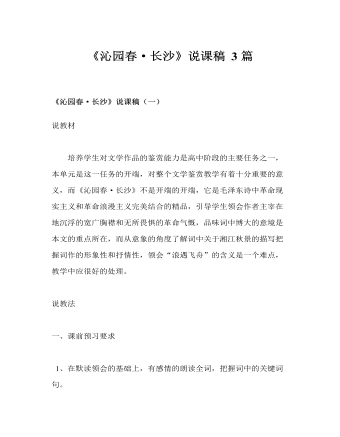
人教版高中语文必修1《沁园春·长沙》说课稿3篇
4、学习全词:(1)背景介绍,让学生看课文中的年代,然后让学生回忆1925年的毛泽东的情况,老师适当提示,让学生了解其背景。(出示幻灯片)(2)学生自由朗读,结合注释和背景理解诗词。(3)师生共同理解全词①先让学生齐读前三句,思考正确的语序,并用正常的语序解释。②品味第三到第十句,这里是教学的一个重点,要让学生先读,再理解,在此基础上训练学生的想象能力。③分析上阙中的最后三句。④小结上阙。提出了一个问题“谁主沉浮”让学生在文中找内容回答,然后转入下阙内容的分析。⑤分析下阙内容,回答“谁主沉浮”的问题,突出本文主旨5、描绘诗词形象:学生用自己的语言把上阙的内容生动地描绘出来。6、欣赏学生优秀作品。(根据时间具体而定,也可以作为课后作业)
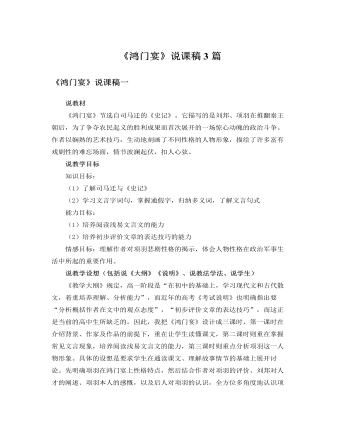
人教版高中语文必修1《鸿门宴》说课稿3篇
3、拓展延伸,启迪心智,创设课堂训练营。三、说学法1、纸上得来终觉浅,圈点、勾画、批注法,学好文言基本功。2、自主合作加探究,眼耳口脑手并用,破疑解难在其中。四、说课时安排《鸿门宴》篇幅较长,文言知识较丰富,文章内涵丰厚,因此我设计用五课时教学本文。第一课时:了解作家作品,积累文言知识,感受作者隐忍发愤的著书精神(初读)第二课时:理清故事情节,概括人物形象,学习客观地评论历史人物,(熟读)第三课时:进一步梳理文言知识,精读课文,要求读透。(精读)第四课时:通过对人物、事件的赏析,加深学生对人物的理解,锻炼学生的开放性思维,由学生自主认识到人物的性格,悲剧的原因等问题。(赏读)第五课时:补充课本教学内容:同学生一起阅读古今关于刘邦项羽的一些篇章:让学生投入进来,把握自己眼中的项羽。(展读)在文言文学习的过程中,采取五步学习法:初读-熟读-精读-赏读-展读(板书)
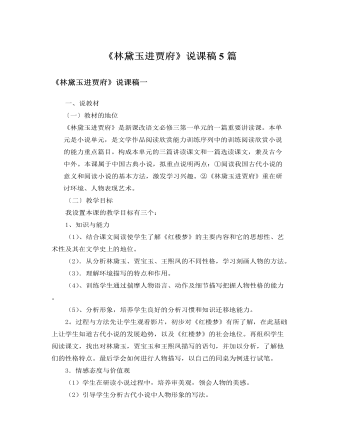
人教版高中语文必修3《林黛玉进贾府》说课稿5篇
【教学目标】我设置的本课的教学目标有三个:1、知识与技能(1)了解曹雪芹及《红楼梦》(2)学习通过一个人物的行踪、所见所闻,介绍典型环境,认识封建贵族阶级豪奢极耻的生活以及森严的等级、礼仪制度(3)分析小说人物出场的描写艺术,培养学生分析小说人物形象的能力。(4)一叶落而知秋”,通过对“林黛玉进贾府”这一故事情节的把握是否能引发对《红楼梦》的认知兴趣,并找到一个突破口,有针对性地进行自主探究,进而进行个性化解读。(5)整体认知小说,认识小说悲剧的必然性和思想价值.2、过程与方法(1)用直观演示和归纳探究法分析文章要点。(2)用讨论探究法体验作者对文中人物的情感态度。3、情感态度价值观(1)正确理解《红楼梦》的思想内涵,培养学生热爱祖国传统文化的思想感情。(2)认识封建大家族的腐朽没落,理解贾宝玉追求个性自由反封建的精神。
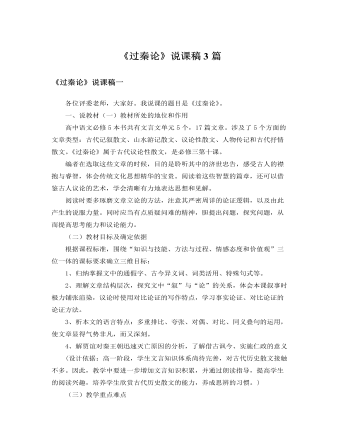
人教版高中语文必修3《过秦论》说课稿3篇
本文篇幅较长,并且有一字句不易理解,因而对高一学生来说完全读懂内容有一些困难。这样的话,老师就要做好引导工作,把一些难点,或是出现词类活用比较多,局势比较特殊的句子,老师可以先给学生画出来,存疑,或是与同学们一起讨论解决。对那些不易懂的字词就引导学生联系上下文提供的语境、前后涉及的情节加以推测、判断,以培养学生依据文脉推断词义的好方法。要求学生点出重点实词、框出通假字,主要是为帮助学生积累和掌握一些文言文中常见的一词多义、异读现象、古今异义和通假现象的词语,并进一步得出规律,指导今后的文言文学习。词类活用和特殊句式在文言文翻译中难度较大,也是本文教学的两大难点。要求学生标出有活用现象的字和划出句式特殊的句子,是基于两点考虑:1、积累一定数量的第一手例句;2、引导学生加以分类,找出每类的相同特征,并抽取出来形成规律性的东西,从而上升到理性认识,使学生能由学会一个到会学多个。翻译过程中注重指导学生养成用符号法表示重点字句的好习惯,如点、框、圈、划线等符号应约定一致,便于突出翻译中的重点、难点及复习。我的提示着重归纳了实词“制”“亡”“遗”“利”等,名词活用、形容词活用、使动用法,被动句、状语后置句。
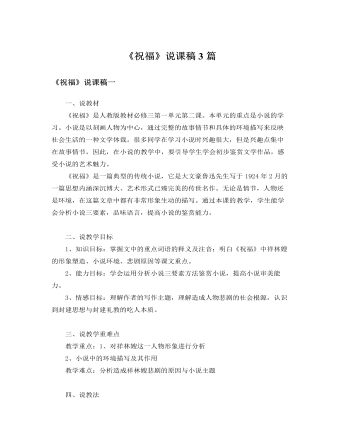
人教版高中语文必修3《祝福》说课稿3篇
各位评委老师,大家好。我说课的题目是《祝福》。一、说教材(一)教材所处的位置和地位高中语文新课程教材必修五本书,共有2个单元中外小说单元。一个必修3的第一单元,一个是必修5的第一单元,共六篇文章。(《林黛玉进贾府》《祝福》《老人与海》《林教头风雪山神庙》《装在套子里的人》《边城》)《祝福》是属于前者。小说是拥有众多读者的一种文体,它可以多方面刻画人物性格,描摹人物心理,完整地表现人物之间的冲突,还可以具体生动地再现人物生活的环境,因此在反映复杂的社会生活方面具有独特优势。所以学习小说这种文学样式,也是有助于学生学会鉴赏小说的基本方法,为将来的小说阅读打下基础。鲁迅的《祝福》是中国现代小说的精品,当中的人物祥林嫂也是鲁迅小说中与阿Q、孔乙己三个最为出名的人物之一。研读好这篇文章,对将来小说的阅读,小说中人物的理解,甚至小说的写作都有深广意义。
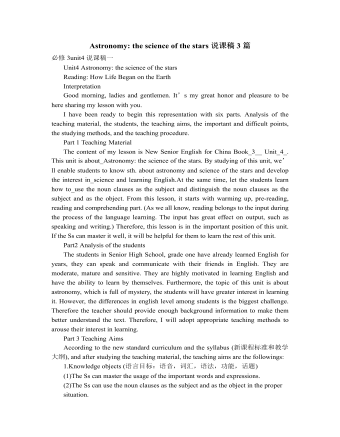
人教版高中英语必修3Astronomy the science of the stars说课稿3篇
Step 2 Pre-listeningAfter students finish their discussion, I will show a picture of Newton and ask them: Who is him? What is he famous for? Could you find out some words to describe him? Maybe students will answer that he is genius for his finding of theGravitation, making a great contribution to the progress of human being. At that time I will show another two pictures of Einstein and Hawking, letting students guess who they are and write down their idea about the Gravitation. For I have arranged them to search more information about the gravity before this class, Students have beenfamiliar with the topic and will not be afraid about this abstract conception, which is helpful for their listening.Step 3 While-listeningIn this step, students will be required to listen the material for three times. The first and listening is extensive listening and the second and third listening is intensive listening. In the first time, They are required to listen a material including Part 1 and Part 2 and choose the best summary of the listening text. After they choose the right answer, They also need work in group to explain what is wrong with the others. Then I will make a conclusion that we should pay attention to the first paragraph and last paragraph and some keys to get the main idea. By doing this, their capacity of generalization will have a great improvement.Before the second listening, I will ask students to scan the blank on the power point quickly and ask them to note down some key words .Then ask them to listen to the Part 1again and fill the first column of the chart. Maybe some students just show the ideas of these three scientists an still can’t catch their development of gravity. Therefore, I will ask them to listen to Part 2 again and fill in the rest. After finish the listening, I will give them ten minutes to discuss with their partner. I will also guidethem to improve their answers when they discuss with others.
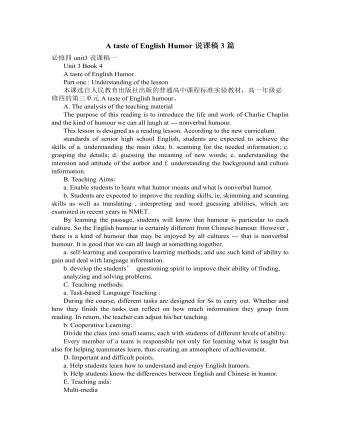
人教版高中英语必修4A taste of English Humor说课稿3篇
Then I would ask them to think of a funny English or Chinese and tell it to partners. While telling stories, they can use expressions and some acting to help make the story funny. 5 minutes would be given to do this.Those stories they told there will be the material for their writing. Soletting them tell it at first is helpful. And they can make a difference between telling a funny story and writing it down. Generally speaking, it is difficult forstudents to write well because they don’t know what to write and how to write. Asking them to tell their own stories at first can help them come up with what to write.After their telling, I would invite someone to share his/her story with all of us and I would write it down on the blackboard.This example story would be used as a sample to illustrate the format of funny story. Different from a story from teacher or textbook, a story from students can obviously become a interesting material to draw students’ attention.Then I would ask the whole class to put this story into several parts. It might be a little bit difficult for them. So I would ask them to find out whether all the sentences are necessary. After delete some sentences, there are 6 sentences left behind. Then they can easily put them into three parts. After interaction with students, I would teach them the right terms for each part and conclude the format of funny story.This step is the key and difficult point in my lesson. So I mainly usetask-based teaching method in this part and the task for students was divided into several stages. With the separated difficult level, students can find there are usually three parts in writing. They can also learn to write without the unnecessary parts in the process of analyzing. And then I wouldn’t rush to tell them the right terms to them directly. Instead, I would ask them to name them by their own. A confused mind is better for acquiring knowledge.While-writing:Then I would give students 7 minutes to write down this story, without other requirements.With all the preparations in pre-writing, students’ difficulties were cleared. So it would be much easier for them to write down the story within 7 minutes. There are no other requirements because students’ first writing is actually a drafting. It would be revise and edit several times later. Writing, as a skill
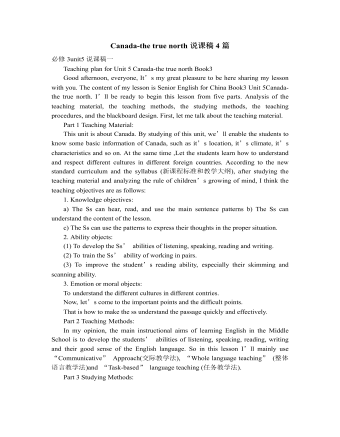
人教版高中英语必修3Canada-the true north说课稿4篇
Good afternoon, teachers, It’s my great pleasure to be here sharing my lesson with you.The content of my lesson is Senior English Book 3 Unit 5 Canada —— “The true North”.I’ll be ready to begin this lesson from five parts. Analysis of the teaching material,the teaching methods,the studying methods, the teaching procedure,and Blackboard design.First, let me talk about the teaching material.Part 1 Teaching Material:This unit is about the introduction of Canada. By studying of this unit,we’ll enable the students to learn the geography, population, main cities, and natural beauty, natural resources of Canada. Through the training of the unit, it also requires students to learn some Language skills such as the expressions of position and emotions.So it plays an important part in the English teaching in this book.After studying the teaching material and analyzing the rule of children’s growing of mind,I think the teaching aims are the followings:1.Knowledge objects:(1) make the students learn some new words and phrases(2) make the students understand the content of the lesson.2.Ability objects:(1)To develop the Ss’ abilities of listening, speaking, reading and writing. Especially reading and speaking ability.(2) learn to talk about the characters of Canada in English(3)To train the Ss’ ability of working in pairs.3.Emotion objects:(1)Enable students to understand the characters of Canada..(2)Stimulate Ss to work hard to make China stronger.Part 2 Teaching Methods:I think helping students learn to master new words and phrases and improve the students’ reading and speaking ability is import and the difficult.According to the analysis of the teaching material and the import points and the difficult points,I will use the following teaching methods : question-guiding approach; fast-reading and careful reading; multi-media teaching methods; discussion
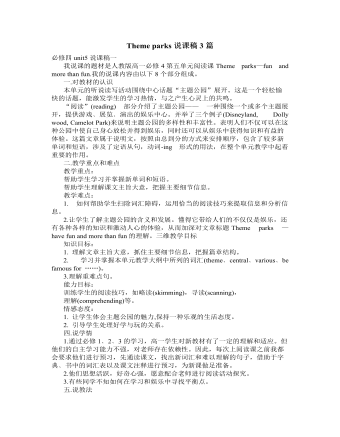
人教版高中英语必修4Theme parks说课稿3篇
The oldest and the most popular park in the worldenjoy the exciting activities thereget close to the life-size cartoon characters like Mickey Mouse and Donald Duck Step 3 Pre-reading1.What do you suppose a theme park is ?2.What do you think you can see in a theme park?(1.It is a kind of amusement park which has a certain theme – that the whole park is based on. 2.buildings, castles, statues, rare animals and birds, and so on.) Step 4 Reading ----- Theme Parks –---- Fun and More Than Fun1.Predict : Read the title and the pictures on P. 34 and PredictWhat is the meaning of the title “Theme Park – Fun and more than fun”?(The title means that theme parks are fun to visit, but that they can also be educational and can offer useful information.)2.Skimming Fast read and answer:What activities can we take in a theme park?Amusement park: Bumper car Merry-go-round slide bungee jumping Free-fall rides Horror films Pirate ship Ferris wheel roller coaster3.Scanning Read again and you will find various theme parks are mentioned in the passage . Then what are they ?Theme parks: Sports theme park History theme park Culture theme park Marine or Ocean theme Park Future park Science theme park Disneyland4.Careful reading and find the main idea of each paragraph:THEME PARKS---- entertaining/ educationalPara.1 Traditional parks are places to go for relaxation and to have time away from our busy lives.Para.2 Theme parks are different They’re large and full of things to do, see and buy.Para.3 Theme parks are built around a single idea or theme. One example is a sports park.Para.4 Another kind of theme park is historical more and cultural and can be educational.Para.5 Disneylandwas the first theme park. It is based on the fantasy life and characters of Disney’s films.Para.6 Some examples of educational theme parks include sea world parks and science parks.

